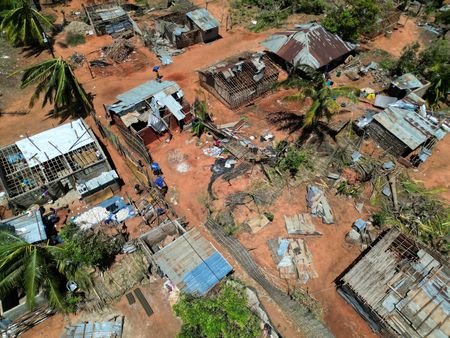By Tassilo Hummel and Antoine Demaison
DOUJANI, Mayotte (France) (Reuters) – The destruction wreaked by cyclone Chido on Mayotte can be seen across France’s Indian Ocean archipelago. In the hillside shantytowns where the storm hit hardest, police, emergency workers and French officials are harder to find, locals said.
The sound of hammers and saws was omnipresent on Wednesday, as people rushed to rebuild their makeshift homes before the next seasonal deluge.
Last weekend’s storm, the most powerful in 90 years, wiped out entire neighbourhoods in Mayotte, which was colonised in 1843 and where more than 75% of its estimated 321,000 people live below France’s national poverty rate.
The official death toll stands at 31 but hundreds, or even thousands, could be dead, officials say. An estimated 100,000 people have been left homeless.
Ahead of President Emmanuel Macron’s visit to the territory on Thursday, several inhabitants in Mayotte’s favelas told Reuters they were left by themselves to rebuild, with barely any help from the government or security forces.
“We haven’t seen anyone from the state here”, said El-Yassine Ibrahim, who worked as a social worker before the cyclone disrupted public life in Doujani, a poor neighbourhood south of Mamoudzou, the capital. “They are certainly busy with other things.”
The French state is historically less present in Mayotte’s many shantytowns, built to house an estimated 100,000 undocumented migrants, mainly from Comoros and Madagascar. The poorly built slums, eviscerated by the storm, have been marked by extreme poverty and insecurity, locals and officials say.
“The police never come here,” said Saida Saindzou, a young woman from Bonovo, another poor neighbourhood next to Doujani.
During a four-hour visit to Doujani and Bonovo, near the capital Mamoudzou, Reuters journalists saw no police, soldiers or other French officials.
A spokesperson for Mayotte’s prefect said she had no information on the situation in the two suburbs. She declined to comment when asked how many state and army officials were currently deployed in the territory. The government said it would send 1,800 police and 1,600 military staff.
A few metres down the road from Saindzou’s destroyed home in Bonovo, Abdu Youssef Ahamada, 16, was standing in front of a pile of mangled debris where his home once stood.
He also said he hasn’t seen any police in recent days, including at night when a handful of “gangsters” were roaming the street. French officials were also absent as Mayotte prepared for the storm, he said.
“They sent us a text message telling us to take cover,” he said. “So I got under the bed with my siblings. When we rose again three hours later, the house was gone.”
Nobody died in their communities, locals said, but the hills which once housed hundreds of immigrant families living among banana and mango plantations had been reduced to fields of dirt.
Many of those immigrant families are homeless now, locals said, while some were being sheltered by neighbours.
“The trees served to hide the misery,” of the immigrant families’ existence, said local resident Fahar Aboudhamir. “It’s with the trees gone that people now see Mayotte’s suffering.”
(Reporting by Tassilo Hummel; Editing by Gabriel Stargardter and Jonathan Oatis)













